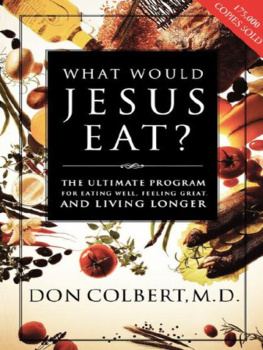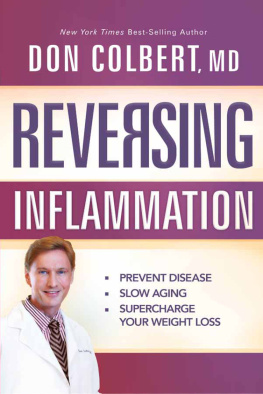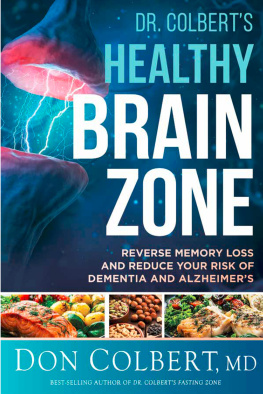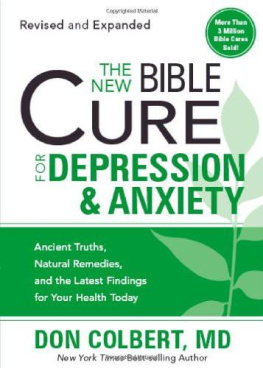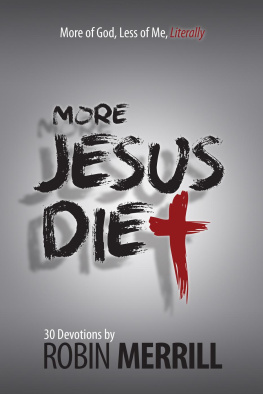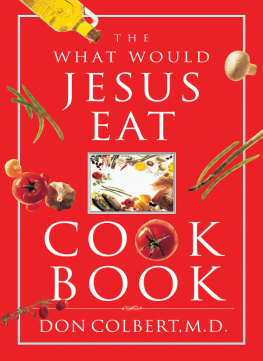WHAT WOULD
JESUS EAT ?
WHAT WOULD
JESUS EAT ?
DON COLBERT, M.D.

This book is not intended to provide medical advice or to take the place of medical advice and treatment from your personal physician. Readers are advised to consult their own doctors or other qualified health professionals regarding the treatment of their medical problems. Neither the publisher nor the author takes any responsibility for any possible consequences from any treatment, actions, or application of medicine, supplement, herb, or preparation to any person reading or following the information in this book. If readers are taking prescription medications, they should consult with their physicians and not take themselves off of medicines to start supplementation without the proper supervision of a physician.
Copyright 2002 by Don Colbert
All rights reserved. Written permission must be secured from the publisher to use or reproduce any part of this book, except for brief quotations in critical reviews or articles.
Published in Nashville, Tennessee, by Thomas Nelson, Inc.
Oliver Nelson titles may be purchased in bulk for educational, business, fundraising, or sales promotional use. For information, please e-mail SpecialMarkets@ThomasNelson.com.
All Scripture quotations are from THE NEW KING JAMES VERSION unless otherwise designated. Copyright 1982 by Thomas Nelson, Inc. Used by permission. All rights reserved.
Library of Congress Cataloging-in-Publication Data
Colbert, Don.
What would Jesus Eat? : the ultimate program for eating well, feeling great, and living longer / by Don Colbert.
p. cm.
Includes bibliographical references (p. ).
ISBN 0-7852-6567-8 (hc)
ISBN 0-7852-6334-9 (ie)
ISBN 0-7852-7319-0 (sc)
1. NutritionReligious aspectsChristianity. I. Title.
BR115.N87 C65 2002
241'.68dc21 2002000867
Printed in the United States of America
05 06 07 08 09 RRD 10 9 8 7 6 5 4 3 2
This book is dedicated to my father, Don Colbert Sr., for the love
and discipline that he imparted to me. He was also instrumental in
leading me to a personal relationship with Jesus.
CONTENTS
INTRODUCTION
WHAT WOULD
JESUS EAT ?
WHAT WOULD JESUS DO?
This question has been asked millions of times in recent years. We read the question or see the acronym for itWWJDon everything from bumper stickers to bracelets.
Most Christians I know truly want to understand what Jesus would do, and they truly want to follow His example in any given situation. We certainly want to love and honor our heavenly Father as Jesus did. We want to obey the Ten Commandments as He did.
We want to learn how to love other people as He did, and how to help them in both miraculous and mundane ways.
We want to follow Jesus teachings when it comes to the use of our time, our talents, and our financial resources.
But do we want to eat as Jesus ate?
Why shouldnt we? We seek to follow Jesus in every other area of our lives. Why not in our eating habits?
Jesus cared about the health of people. Certainly His many healing miracles are testimony to that fact. He desired that people be made whole, and that included being whole in body as well as in mind and spirit.
But did Jesus actually teach anything about nutrition or how we should eat?
My contention is that He didnot necessarily by what He said, but by what He did. There are hundreds of examples throughout the Bible of practices related to healthy eating. Jesus embodied them fully in His lifestyle.
Even casual readers of the Bible know of many stories that refer to food as part of, or the main focus of, the story. Jesus taught key spiritual principles using a number of food analogies. He also participated in biblical feasts and celebratory meals. At the Last Supper, He instituted a ritual that involved food as the most sacred memorial of His death.
The medical and scientific facts confirm it. If we eat as Jesus ate, we will be healthier. He is our role model for good habits in eating, exercising, and living a healthy, balanced life.
But, you may be saying, times have changed since Jesus walked the earth two thousand years ago. Technology has advanced. We have many new foods today that Jesus didnt know about. Our eating patterns are vastly different.
Yes... and no. Times have changed and our eating patterns are different, but that isnt necessarily a good thing!
When you think of the American diet, of what do you think? Generally, we eat three large meals a day. Most people in other nations eat only two meals a day.
When you think of Southern cooking, of what do you think? Almost everything is fried. Fried chicken, fried country ham, fried potatoes, fried onions and other vegetables. Added to that are biscuits high in fat, covered with butter, and mashed potatoes smothered in rich milk gravy.
When you think of a good meal, of what do you think? Usually, in our minds, a good meal is one that includes dessert. Many Americans do not consider a meal to be proper or complete without something sweet at the end.
When you think of the American diet, that is not the way Jesus ate. Instead, the way we are eating has put us into the fast lane of health decline.
In 1901, the United States was classified as the healthiest nation in the world among one hundred nations studied. By 1920, we had dropped to second place. By 1950, we were in third place. By 1970, we were in forty-first place. And in 1981, we had dropped all the way to ninety-fifth place!
How does a nation go from being in forty-first place in the area of good health to being in ninety-fifth place in only eleven years? And from first place to ninety-fifth place in just one century? The answer can be summed up in two words: fast food.
The typical American now consumes three hamburgers and four orders of French fries every week.
In 1970, Americans as a whole spent approximately $6 billion on fast food. In 2000, we spent more than $110 billion. We spend more money on fast food than we do on personal computers, computer software, new cars, and higher education combined. We also spend more on fast food than on all magazines, books, movies, newspapers, videos, and recorded music combined.
The reason fast food has risen in popularity so dramatically is simpleour fast pace of life almost demands it. People feel they are too busy to prepare traditional meals, and they see fast-food meals as time saving alternatives. In addition, many times it costs more per serving to prepare a traditional meal than to purchase a single serving at a fast-food restaurant. This is due to the fact that most of us do not routinely prepare home-cooked meals, and so we may waste much of the food we bring home from the market.
In our culture, advertisements constantly bombard us and often fuel our desire for fast food. Incentives are offered to children in the form of toys included with a meal and playgrounds just outside the restaurant. Furthermore, a fast-food restaurant is usually never more than a mile or two away. The end result is that good nutrition is sacrificed to convenience, cost, and accessibility.
Fast food is designed to appeal to these four senses: sight, smell, taste, and touch, or texture. One of the primary ways of adding both taste and texture to food is to add fat. One of the key ways of adding taste to food is to add sugar. Foods that have a glaze or a glow to themfrom donuts to cake icingare foods that have had a layer of fat added to them. In addition to having virtually no nutritional value, fast foods tend to be high in salt and low in fiber.
Eating a diet high in salt, low in fiber, very high in fat and sugar, and virtually void of nutrients is not the way Jesus ate.
Next page
